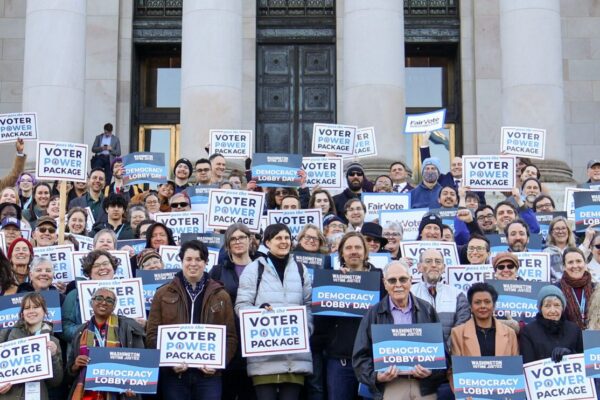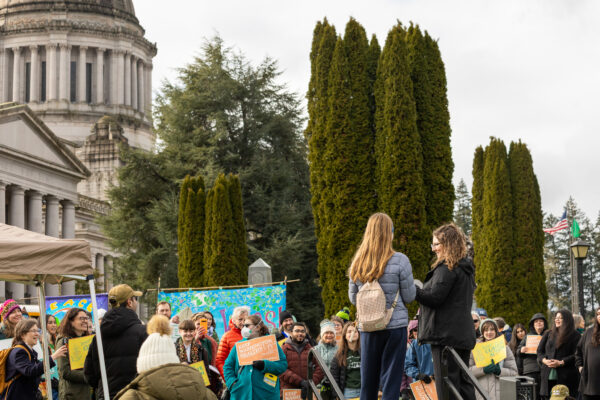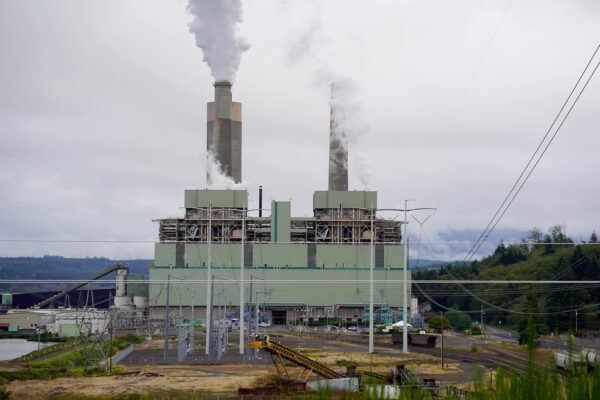OLYMPIA, WA–Just now, a House and Senate conference committee formally recommended a compromise bill to establish a Clean Fuel Standard (HB 1091). The conference committee consisted of a bipartisan, bicameral group of legislators: Representatives Fitzgibbon, Slatter, and Dye working alongside Senators King, Carlyle, and Mullet to develop the final version of the bill. The bill received the support of the four Democratic members of the committee, and it now heads to a final vote by each chamber before moving to Governor Inslee’s desk to become law. The final vote is expected to take place on Sunday, following the expiration of the required 24 hour period of consideration.
A Clean Fuel Standard reduces toxic air and climate pollution by requiring transportation fuel producers to reduce the carbon intensity in their products or invest in the production of cleaner fuels, such as sustainable biofuels and electricity. The transportation sector is the largest source of carbon pollution in the state, and Washington is the last state on the continental West Coast to adopt a policy to significantly reduce transportation pollution.
“This is really exciting for the future of Washington’s clean energy workforce,” said Matthew Hepner, executive director of the Certified Electrical Workers of Washington. “By creating market certainty for low carbon fuels in our state, we ensure that technologies and fuel advancements directly benefit Washington communities – and are not simply exported out of state. But we must move quickly to implement the program to maximize economic benefits.”
“Finally, families living with air pollution day-in and day-out will get some relief,” said Dr. Chris Covert-Bowlds, family physician and member of Washington Physicians for Social Responsibility. “We cannot waiver in our drive to improve the health of all Washington residents. To eliminate the systemic health impacts of bad air we must hasten the transition to a 100% zero-emission vehicle fleet.”
Washingtonians have worked relentlessly to adopt a Clean Fuel Standard for at least a decade. These efforts have included what advocates considered a “poison pill” added to the 2015 Transportation Package, stating that if the Administration established a Standard, all funds from the multi-modal account would go to highway purposes. This further exacerbated the climate crisis. For the last three years, the House of Representatives passed a Clean Fuel policy–this year it finally passed the Senate. The conference committee step is necessary to reconcile differences between the bills passed by each chamber. The final step is a simple up-or-down vote in each chamber, with no amendments allowed, before the bill moves to the Governor’s desk for signature.
“Driven by the urgency to preserve our futures and the fury for inaction: it was time for Washington state to do what they should have done years ago. We see this critical step as a signal toward ultimate passage. Washingtonians can sleep better tonight thanks to bold lawmakers in Olympia,” said Rebecca Ponzio, Climate and Fossil Fuel Program Director of Washington Environmental Council/Washington Conservation Voters. “This policy means cleaner air, cleaner communities, and real jobs in the clean energy economy. This is what historic climate progress looks like.”
“Our Legislature is just one step away from adopting a historic policy to address our largest and still growing source of emissions,” said Vlad Gutman-Britten, Washington Director at Climate Solutions. “The oil industry has fought this day because they know it will help usher in the end of our dependence on their toxic product. We’ll fight climate change and promote community health all at the same time. “
For commentary: The following health professionals are available to speak with reporters about the implications of a Clean Fuel Standard and broader climate action for the patients they serve.
- Annemarie Dooley, MD. annemarie.dooley@gmail.com
- Chris Covert-Bowlds, MD. Christopher.J.Covert-Bowlds@kp.org
- Mark Vossler, MD. mark@wpsr.org
###
**Additional media availabilities upon request, including health experts, labor and community leaders, students, and business representatives including from local restaurants**
ABOUT THE ENVIRONMENTAL PRIORITIES COALITION
The Environmental Priorities Coalition is a network of over twenty leading environmental groups in Washington state that influence policy at the state level. For over a decade, the Coalition has selected joint priority issues to work on during the legislative session to help focus environmental community resources and best achieve our shared goals. @epctweets environmentalpriorities.org
ABOUT THE CLEAN FUELS COALITION
Hundreds of organizations, local elected officials and jurisdictions, health associations and hospitals, small businesses, unions and advocacy groups support clean fuels and have been working for several years to see the solution come to Washington. @cleanfuelswork cleanfuelswork.com


